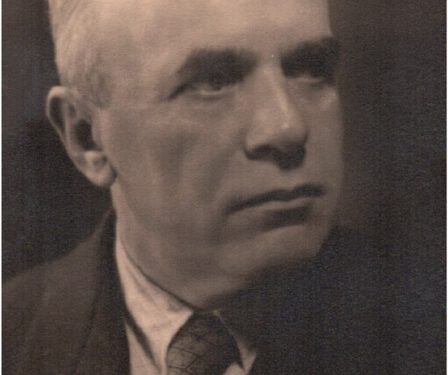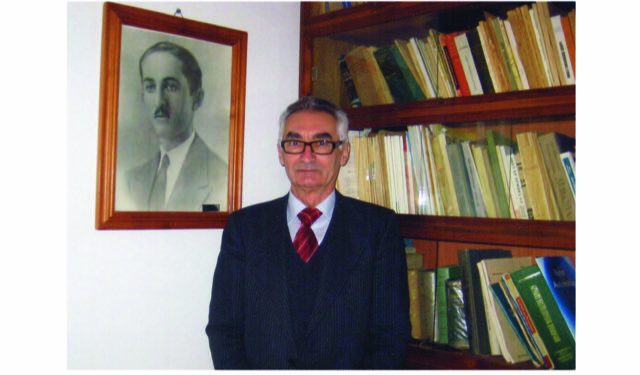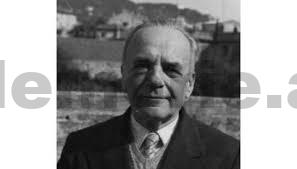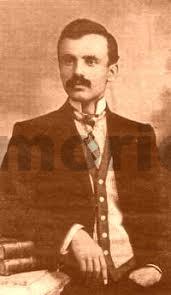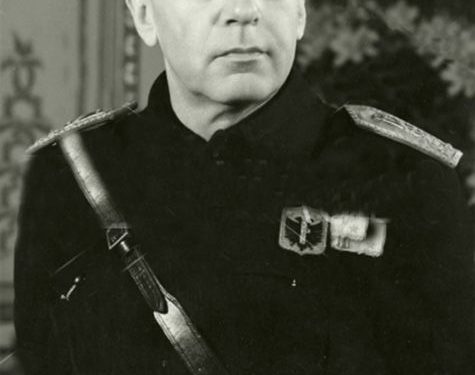By Dr.Prof. Albert Frashëri
Memorie.al/Often times we strangely suppress in ourselves any thoughts that relate to the people around us, to our neighbors, to the city or to the whole nation, without meeting with the neighbor and hiding from consciousness the doubt, hesitation or pain as if we were afraid of the truth.
I return to this argument after reading, albeit belatedly, a valuable book, “Mustafa Kruja in Albanian history” so carefully embroidered by his nephew, the well-known writer and essayist Eugjen Merlika. In this book, through events that cover the first half of the twentieth century, the profile of the patriot and intellectual Mustafa Kruja is realized in a shocking truth. The real one is built with a rich documentation and wisely listed by the author Merlika. A bunch of important documents of the years 1908-1914 are related to the creation of the first Albanian state, in the construction of which Mustafa Kruja is not only one of the signatories but also an important actor of events. Then we find documents published in Rome in 1919 entitled “Albania before the Peace Conference” and further the author refers to the fund “Albanian Responses” of the Central State Archive from the file of Mustafa Kruja, dated 1941.
In those first two decades, the young and non-conformist intellectual, Mustafa Kruja, although with passion, analyzes with logic, composure and respect the views with which he agrees or disagrees. “He”, writes the author for Kruja, “relies strongly on all the values of his nation, on his prominent personalities such as the Frashëri brothers or Sulejman Delvina, who have given a valuable contribution to the Ottoman culture, but always remain the sons of their people. ”
Eugjen Merlika shows special talent and maturity in the analysis of the documentation and dramatic events of that period. It seems that the difficult life from one Hoxha’s camp to another has helped him, thanks to intelligence, to turn into wisdom the life experiences and individual and intensive studies that have enriched his life. His observations and conclusions are quite interesting when he analyzes the efforts of Muslim and Christian patriots for the alphabet of the Albanian language against the ignorance of the pro-Turks who defended an Arabic alphabet for the Muslim believers. From the analyzes and documents inserted in the book, it becomes clear the important role of Mustafa Kruja in that ordeal of events for the declaration of independence and the construction of the first Albanian state. This effort unanimously had a secular and Western-spirited conception aimed at bringing the nation back to Europe.
The documents that shed light on the political developments in Albania and especially those related to the Greek interventions in the developments of the last century are very interesting. The nature and boundaries of this writing do not allow me to deal with the detailed documentary content of this valuable book, but to prove its great value for the Albanian nation and for the historical truth, I want to recall the drama of the events brought by those documents regarding the misery, killings and robberies that the Greek and Serbian governments of that time inflicted on the indigenous Albanian population. According to the documents, as the author E. Merlika states, “The Albanian element in three special circumstances was hit mercilessly with massacres and destruction… “.
As I said a little above, the idea and purpose of this article is related to the awareness that the citizen has or should have of the historical truth and the objective evaluation of its events and actors. The publication of this book brings light on the figure of Mustafa Kruja that the Enverian regime denigrated and censored just as it did with many patriots, such as Gjergj Fishta, Mit’hat Frashëri and Mehdi Frashëri, Faik Konica and Ernest Koliqi, and many others.
The censorship of half a century of communism suppressed the minds and souls of the people. The indifference of today’s political class to the cultural sights of the Albanian world make the problem of recognition and respect that the prominent figures of the nation deserve more urgent.
Why should we still talk about the censorship of a Western regime and the indifference, the inertia of today’s politics? The number of documents in the third part of the book entitled “Albanian Responses”, drafted and signed by Mustafa Kruja, Fejzi Alizoti, Xhemil Dino, Dhimitër Berati and Tahir Shtylla, provides data documenting the spread of Albanians and the Albanian language. in the Illyrian Peninsula, in what history alienated in the “Balkan Peninsula”. This alienation was intended to annihilate the memory of the Illyrian universe. The documentary data of this book give clear ideas about the dramatic developments and negative consequences that the events of the last century have created for this ancient deeply European nation. Albanians have lost consciousness of the great human potentials that lurk within them. In the book on Mustafa Kruja we find these documents and attention, while in the half totalitarian century no trace.
The problem of identity is not a purely educational issue of the school, on the contrary, it is a set of basic qualities that lead to the creation of national consciousness. On the other hand, identity is the key, the path through which the civilized world can know and understand five or six million Albanians of the Illyrian peninsulas. Hoxha’s anti-national regime erased from the hearts and minds of Albanians the essential images of the national tradition and created the myth of the young man, the slave oppressed, miserable and humiliated by him. Today, if we want to characterize the current state of this ancient nation, we can without exaggeration claim that it lives with a complete cultural and identity disorientation.
By carefully reading this book by Eugjen Merlika, some questions come to mind. First, how is it possible for a prominent intellectual and patriot like Mustafa Kruja and many others, important figures of twentieth-century national history, to be censored by barbarically raping historical truths? Secondly, how is it possible that in this effort of the so-called “democratization of the country”, there is no intense movement organized by the political class or the academic world to revive the cultural and identity images of the nation through prominent figures his?
Without culture there is no development. Let us recall, for example, the case of the Danes, whose state is one of the smallest among Western countries. Denmark, with a population approximately equal to that of the Albanians of the Illyrian peninsula, is in the first places of all world classifications on human, technological, economic, educational and social developments. According to a study conducted and published by UNESCO, Denmark deserves the title of “happiest country in the world”. This is possible only thanks to the cultural development and national traditions strictly respected in the development model of the country. But it is not just that. In life it is the dignity of the nation that gives value to individual existence. . . and it depends a lot on the reputation and the culture we radiate in the correct relations with other peoples.
The misery brought by the Ottoman darkness and the absurdity of the communist regime left the most serious consequences in the field of culture. With Hoxha’s totalitarianism, what happened with the emigrations after the 15th century happened, when rich and knowledgeable people left this land, passing on from generation to generation the historical and cultural consciousness of the nation. That attack was the result of the cultural genocide that the Turks exercised over the only nation of the Illyrian peninsula. After the creation of the Albanian state in 1912, education was developed in Albania. The young people left the road to Istanbul and went to Europe to study. The newly formed state was quickly regaining the physiognomy of European countries. . . but starting from 1945 in Albania, the same Anatolian and cruel cultural vacuum that the nation had known since the dawn of the Ottoman occupation resumed. The inhuman regime of Hoxha and his loyal and fanatical partners led to persecutions, persecutions and shootings, with or without trial, aimed at exterminating the country’s patriots and intellectuals. These were censored and the post-war generations in 45 years recognized only anti-national and anti-human party dogmas. Therefore, recognizing and including the work of patriots and major figures in the almanacs of national history and culture is a patriotic duty and expression of gratitude that today’s citizen shows towards them. This is the motive for which we should congratulate the author Eugjen Merlika who through this book brings us among the ranks of patriotic intellectuals the emblematic figure of Mustafa Kruja.
At this historic moment there is an intensification of propaganda by the chauvinists around us. There is a systematic onslaught of articles and pseudo-studies trying to revive the myth of Serbian primacy on the Illyrian peninsula. I can mention the author V.B.Sotirovi me with the writings “Immigrants, refugees and ethnic cleansing – the death of Yugoslavia 1991-1999″ (2013), in which he presents the Serbs as victims of the nations that were liberated from them. The author at the top of the article even quotes the war criminal, the perpetrator of the genocide in the Yugoslav republics, Radovan Karadzic, prosecuted and condemned by the civilized world: the whole world is against us. ” From the same author comes the study on “Dialects as ethnic-linguistic borders of the united Serbian state” (2012), so the languages of non-Serb nations of that state, according to him, have characterized the “perimeter borders” of Serbian. At the end of this study is shown the idea of the panserb program for the XXI century and the future map of Serbia exactly how it was invented by those who overthrew the Austro-Hungarian Empire after the First World War. Such writings and studies that falsify the history and insult the dignity of one of the most ancient nations of Europe, deserve relevant studies by the Albanian cultural universe.
More foreigners are dealing with these vital issues than the Albanian world of the last half century. This is a laziness not only guilty but also unforgivable. The ancient world and the modern western one has many works dedicated to the Albanian nation and which, in addition to the problems, highlight its undoubted values. Works by many historians, Hellenes and others are available that prove the opposite of the nonsense claimed by the Greeks or Serbs for a century
These books and resources can be found without much difficulty and yet lack scientific (non-existent) debate. Important works dedicated to the Albanian nation are not known or missing in references. There are plenty of examples. In 1777 the Arbëresh Nicolò Chetta (Nikolë Keta) published in Italy the work “Tesoro di Notizie su de’Macedonia” where he in about 560 pages, among others, shows that Albanians and Macedonians spoke the same language, so they were together Illyrians. The same views are expressed and confirmed, referring to the Hellenic historians, by the Frenchman Jean-Claude Faveyrial in his voluminous book “Histoire de l’Albanie” (1885). To quench our curiosity, let us quote something from the preface of the author Faveyrial who has spent most of his life in the Balkans and more than ten years in Albanian lands. Faveyrial writes: “Long before Providence threw us on the shores of Albania, we had seen well-known inhabitants of this country and had said among ourselves:” Really beautiful people. ” This good initial idea then turned into a conviction during the relationship we had with Prince Bib Doda of Mirdita. It was at that time that we decided to study, in the light of history, this people who have witnessed such beautiful characteristics and who have lived moments so magnificent that they deserve special respect. . . The venerable Dozon, former consul of Ioannina, had compiled a collection of songs, grammar and dictionary of Albanian. He has left a written testimony that deserves special respect. Here is what he writes: “Phonetically, Albanian has a richness and variety that far exceeds the language of Aristophanes.” How guilty is the Greek clergy that has ignored it and continues to avoid the culture that expresses this beautiful language! . . . However, the Albanians have realized that they are victims of mystification and they know very well that the Greeks are taking over the merits of the other. ”
It seems as if I made a leap towards the book “Mustafa Kruja in Albanian history”. In fact, not! I could not express the content of that rich and complex book in the lines of an article. I simply wanted, taking occasion from this serious work of the author Eugjen Merlika, to emphasize the need that society has today to regain awareness of the values of the Albanian nation throughout its existence. The saga of the “Kruja Merlika” family experienced endless censorship, sentences and half a century of internment. But on the one hand the regime could not alienate their ideas and beliefs; on the other hand, the Merlikaj saga proves the need to be true in all its aspects. This cannot be achieved outside of the bright figures who have made significant contributions to the nation’s history and culture.
Memorie.al




